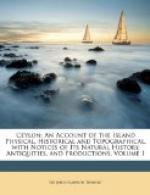* * * * *
NOTE.
DESCRIPTION IN THE MAHAWANSO OF THE LANDING OF WIJAYO.
The landing of Wijayo in Ceylon is related in the 7th chapter of the Mahawanso, and Mr. TURNOUR has noticed the strong similarity between this story and Homer’s account of the landing of Ulysses in the island of Circe. The resemblance is so striking that it is difficult to conceive that the Singhalese historian of the 5th century was entirely ignorant of the works of the Father of Poetry. Wijayo and his followers, having made good their landing, are met by a “devo” (a divine spirit), who blesses them and ties a sacred thread as a charm on the arm of each. One of the band presently discovers the princess in the person of a devotee, seated near a tank, and she being a magician (Yakkhini) imprisons him and eventually the rest of his companions in a cave. The Mahawanso then proceeds: “all these persons not returning, Wijayo, becoming alarmed, equipping himself with the five weapons of war, proceeded after them, and examined the delightful pond: he could perceive no footsteps but those leading down into it, and there he saw the princess. It occurred to him his retinue must surely have been seized by her, and he exclaimed, ’Pray, why dost not thou produce my attendants?’ ‘Prince,’ she replied, ’from attendants what pleasure canst thou derive? drink and bathe ere thou departest.’ Seizing her by the hair with his left hand, whilst with his right he raised his sword, he exclaimed, ‘Slave, deliver my followers or die.’ The Yakkhini terrified, implored for her life; ’Spare me, prince, and on thee will I bestow sovereignty, my love, and my service.’ In order that he might not again be involved in difficulty he forced her to swear[1], and when he again demanded the liberation of his attendants she brought them forth, and declaring ‘these men must be famishing,’ she distributed to them rice and other articles procured from the wrecked ships of mariners, who had fallen a prey to her. A feast follows, and Wijayo and the princess retire to pass the night in an apartment which she causes to spring up at the foot of a tree, curtained as with a wall and fragrant with incense.” It is impossible not to be struck with a curious resemblance between this description and that in the 10th book of the Odyssey, where Eurylochus, after landing, returns to Ulysses to recount the fate of his companions, who, having wandered towards the palace of Circe, had been imprisoned after undergoing transformation into swine. Ulysses hastens to their relief, and having been provided by Mercury with antidotes, which enabled him to resist the poisons of the sorceress, whom he discovers in her retreat, the story proceeds:—
[Greek:
Os phat ego d aor oxu eryssamenos para
merou
Kirkeepeixa hoste ktameuai meneainon.
k. t. l.]
[Footnote 1: [Greek:




